

SUBSCRIBE TO OUR FREE NEWSLETTER
Daily news & progressive opinion—funded by the people, not the corporations—delivered straight to your inbox.
5
#000000
#FFFFFF
To donate by check, phone, or other method, see our More Ways to Give page.


Daily news & progressive opinion—funded by the people, not the corporations—delivered straight to your inbox.
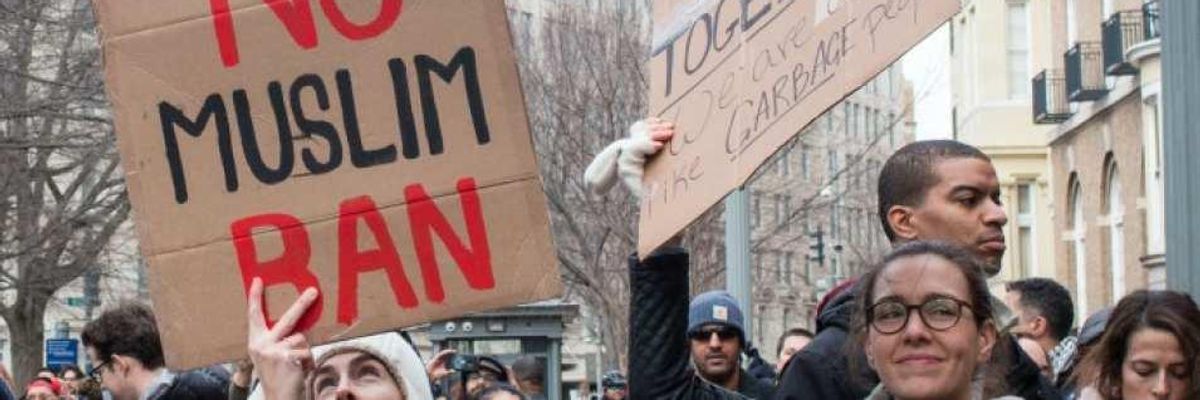
Over and over Americans have called for diplomatic solutions, an end to endless wars, and have worked tirelessly to realize the full breadth of equality and freedoms we have espoused for centuries. (Photo: Liz Lemon/Flickr/cc)
I was born and raised in the United States to Iranian parents and, like many children of immigrants, grew up with a sense of alienation from my fellow Americans. Though raised in the most populace location of the Iranian diaspora in Southern California, my hyphenated identity seemed to be in conflict with itself as Iran was consistently vilified in U.S. media and politics. But rather than attempt to hide my identity, I became determined to move beyond the surface politics to understand more about Iran and, ultimately, to try to bridge the divide between my country of heritage and the country I called home.
To that end, I entered graduate school to study the history and culture of Iran, which also provided me the opportunity to travel there and do field research. An eye-opening experience, I realized that we are more alike than we are different, and any enmity that may exist between the two countries, was a consequence of their governments, not their people.
In recent weeks, the subject of Iran has again dominated much of our news and media attention. From the assassination of Qassem Soleimani, to Iran's retaliation and 176 lost lives in a downed civilian plane, the world held its breath and braced for a possible war. As Iranian-Americans were detained at borders for inappropriate questioning about political views--in an increasingly xenophobic and hostile environment--we were inundated with images and stories of the Iranian-American community, often asked the same question, "how do you feel about the current situation?"
No one person or organization can represent the views of an entire community. Iranian-Americans are not a monolith, they are a diverse group with different socioeconomic, religious, and political backgrounds. However, some broad inclinations can be derived from field research in the diaspora, as well as polling that shows the majority do not support a war with Iran, President Trump's Iran policy, or the travel ban. This should come as no shock, because in fact these are the views of the majority of all Americans.
Despite the prevalence of antiwar sentiments among this diaspora, there are some rather loud voices that have attempted to co-opt the community and speak for all, while defaming anyone with an opposing political view as an agent of the Islamic Republic. Anyone from community advocates and elected officials, to academics, human rights workers, and journalists have suffered such vitriol. Though the strategy is not shocking in the Trump era, it is disconcerting in a period of rising threats to our democracy. It has been jarring to have a president threatening to bomb 52 Iranian cultural sites, while others call for the deportation of U.S. citizens with conflicting political attitudes and the repression of American civil advocacy groups. When Iranian-American civil liberties are endangered with discriminatory practices by Customs and Border Patrol and bank account closures, I assumed fellow Iranian-Americans--despite differences in opinion on the best policies towards Iran--would stand in principle for rule of law and against the unexplained and often humiliating deportations of Iranian students.
It is a point of irony, that the very people who claim to fight for democracy and freedom in Iran, would erode the foundations of democracy in the United States.
It is a point of irony, that the very people who claim to fight for democracy and freedom in Iran, would erode the foundations of democracy in the United States. In a democratic political system, both individuals and groups are given a platform to share their views and support them with analysis and sources. The public is then free to make its own assessments, vote, and support or oppose legislation as they see fit. This is an oversimplification of course, but it gets to the crux of the matter at hand. We are allowed to have opposing views and express them without threats of physical harm, imprisonment, deportation, or slander. This is the most basic component of a democracy.
But to understand this confusion and this divide we must examine the differences of these groups. The Iranian-American diaspora is not as divided as it seems, the issue is that we are having two different discussions. There is an important distinction between a member of the diaspora, which is anyone of Iranian heritage, and a member of a dissident group, which by their own admission seek the overthrow of a foreign government and have already hand-picked its successor from outside Iran. Although the diaspora cares deeply for events in Iran because of our families and friends that reside there, our focus and attention is on the politics of our country, the United States. For dissident groups, the lens through which they see events and discuss them is Iran, not the U.S. Thus, as we yell passed each other, a simple truth is lost, we are not having the same conversation.
I grew up listening to debates about Iran and how best to ensure the freedom that Iranians have struggled to achieve for over a century. While some have held onto vestiges of the past, such as the monarchy that was overthrown in Iran's 1979 revolution, the majority of Iranian-Americans hold firmly that they wish for a democratic and secular Iran, but to be established by Iranians themselves. Additionally, we wish to be treated as equal citizens in the United States, which this current administration has demoralized with the Muslim Ban and sanction laws that harm Americans as well.
It is time to recognize that the "Iranian" hyphen is not an identity in opposition to our American self, but that this diversity actually defines our American identity. As Americans we expect equal treatment under the law, and as Americans we will hold our government accountable to the will of the people. For some Iranian immigrants, especially those exiled or who fled Iran, America may have been a placeholder, a temporary spot to wait out the eventual collapse of the Islamic Republic. However, for most Iranian-Americans, especially those born after the revolution, America is our home. We want democracy and freedom for Iran, not because of Iranian exceptionalism, but because those are the values we aspire for at home, and therefore believe all people deserve.
Though diverse, the Iranian-American diaspora is not as divided as it seems because America is not as divided as it seems. Over and over Americans have called for diplomatic solutions, an end to endless wars, and have worked tirelessly to realize the full breadth of equality and freedoms we have espoused for centuries. Remember that despite the divisive rhetoric of the Trump era, he still lost the popular vote by nearly 3 million. It may be fair to say that disruptive voices are loud and aggressive precisely because they are aware of their own weakness. But the strength of our collective voices does not come from numbers, it comes from the conviction that these words are still revolutionary, "that all men are created equal, that they are endowed by their Creator with certain unalienable Rights, that among these are Life, Liberty and the pursuit of Happiness."
Trump and Musk are on an unconstitutional rampage, aiming for virtually every corner of the federal government. These two right-wing billionaires are targeting nurses, scientists, teachers, daycare providers, judges, veterans, air traffic controllers, and nuclear safety inspectors. No one is safe. The food stamps program, Social Security, Medicare, and Medicaid are next. It’s an unprecedented disaster and a five-alarm fire, but there will be a reckoning. The people did not vote for this. The American people do not want this dystopian hellscape that hides behind claims of “efficiency.” Still, in reality, it is all a giveaway to corporate interests and the libertarian dreams of far-right oligarchs like Musk. Common Dreams is playing a vital role by reporting day and night on this orgy of corruption and greed, as well as what everyday people can do to organize and fight back. As a people-powered nonprofit news outlet, we cover issues the corporate media never will, but we can only continue with our readers’ support. |
I was born and raised in the United States to Iranian parents and, like many children of immigrants, grew up with a sense of alienation from my fellow Americans. Though raised in the most populace location of the Iranian diaspora in Southern California, my hyphenated identity seemed to be in conflict with itself as Iran was consistently vilified in U.S. media and politics. But rather than attempt to hide my identity, I became determined to move beyond the surface politics to understand more about Iran and, ultimately, to try to bridge the divide between my country of heritage and the country I called home.
To that end, I entered graduate school to study the history and culture of Iran, which also provided me the opportunity to travel there and do field research. An eye-opening experience, I realized that we are more alike than we are different, and any enmity that may exist between the two countries, was a consequence of their governments, not their people.
In recent weeks, the subject of Iran has again dominated much of our news and media attention. From the assassination of Qassem Soleimani, to Iran's retaliation and 176 lost lives in a downed civilian plane, the world held its breath and braced for a possible war. As Iranian-Americans were detained at borders for inappropriate questioning about political views--in an increasingly xenophobic and hostile environment--we were inundated with images and stories of the Iranian-American community, often asked the same question, "how do you feel about the current situation?"
No one person or organization can represent the views of an entire community. Iranian-Americans are not a monolith, they are a diverse group with different socioeconomic, religious, and political backgrounds. However, some broad inclinations can be derived from field research in the diaspora, as well as polling that shows the majority do not support a war with Iran, President Trump's Iran policy, or the travel ban. This should come as no shock, because in fact these are the views of the majority of all Americans.
Despite the prevalence of antiwar sentiments among this diaspora, there are some rather loud voices that have attempted to co-opt the community and speak for all, while defaming anyone with an opposing political view as an agent of the Islamic Republic. Anyone from community advocates and elected officials, to academics, human rights workers, and journalists have suffered such vitriol. Though the strategy is not shocking in the Trump era, it is disconcerting in a period of rising threats to our democracy. It has been jarring to have a president threatening to bomb 52 Iranian cultural sites, while others call for the deportation of U.S. citizens with conflicting political attitudes and the repression of American civil advocacy groups. When Iranian-American civil liberties are endangered with discriminatory practices by Customs and Border Patrol and bank account closures, I assumed fellow Iranian-Americans--despite differences in opinion on the best policies towards Iran--would stand in principle for rule of law and against the unexplained and often humiliating deportations of Iranian students.
It is a point of irony, that the very people who claim to fight for democracy and freedom in Iran, would erode the foundations of democracy in the United States.
It is a point of irony, that the very people who claim to fight for democracy and freedom in Iran, would erode the foundations of democracy in the United States. In a democratic political system, both individuals and groups are given a platform to share their views and support them with analysis and sources. The public is then free to make its own assessments, vote, and support or oppose legislation as they see fit. This is an oversimplification of course, but it gets to the crux of the matter at hand. We are allowed to have opposing views and express them without threats of physical harm, imprisonment, deportation, or slander. This is the most basic component of a democracy.
But to understand this confusion and this divide we must examine the differences of these groups. The Iranian-American diaspora is not as divided as it seems, the issue is that we are having two different discussions. There is an important distinction between a member of the diaspora, which is anyone of Iranian heritage, and a member of a dissident group, which by their own admission seek the overthrow of a foreign government and have already hand-picked its successor from outside Iran. Although the diaspora cares deeply for events in Iran because of our families and friends that reside there, our focus and attention is on the politics of our country, the United States. For dissident groups, the lens through which they see events and discuss them is Iran, not the U.S. Thus, as we yell passed each other, a simple truth is lost, we are not having the same conversation.
I grew up listening to debates about Iran and how best to ensure the freedom that Iranians have struggled to achieve for over a century. While some have held onto vestiges of the past, such as the monarchy that was overthrown in Iran's 1979 revolution, the majority of Iranian-Americans hold firmly that they wish for a democratic and secular Iran, but to be established by Iranians themselves. Additionally, we wish to be treated as equal citizens in the United States, which this current administration has demoralized with the Muslim Ban and sanction laws that harm Americans as well.
It is time to recognize that the "Iranian" hyphen is not an identity in opposition to our American self, but that this diversity actually defines our American identity. As Americans we expect equal treatment under the law, and as Americans we will hold our government accountable to the will of the people. For some Iranian immigrants, especially those exiled or who fled Iran, America may have been a placeholder, a temporary spot to wait out the eventual collapse of the Islamic Republic. However, for most Iranian-Americans, especially those born after the revolution, America is our home. We want democracy and freedom for Iran, not because of Iranian exceptionalism, but because those are the values we aspire for at home, and therefore believe all people deserve.
Though diverse, the Iranian-American diaspora is not as divided as it seems because America is not as divided as it seems. Over and over Americans have called for diplomatic solutions, an end to endless wars, and have worked tirelessly to realize the full breadth of equality and freedoms we have espoused for centuries. Remember that despite the divisive rhetoric of the Trump era, he still lost the popular vote by nearly 3 million. It may be fair to say that disruptive voices are loud and aggressive precisely because they are aware of their own weakness. But the strength of our collective voices does not come from numbers, it comes from the conviction that these words are still revolutionary, "that all men are created equal, that they are endowed by their Creator with certain unalienable Rights, that among these are Life, Liberty and the pursuit of Happiness."
I was born and raised in the United States to Iranian parents and, like many children of immigrants, grew up with a sense of alienation from my fellow Americans. Though raised in the most populace location of the Iranian diaspora in Southern California, my hyphenated identity seemed to be in conflict with itself as Iran was consistently vilified in U.S. media and politics. But rather than attempt to hide my identity, I became determined to move beyond the surface politics to understand more about Iran and, ultimately, to try to bridge the divide between my country of heritage and the country I called home.
To that end, I entered graduate school to study the history and culture of Iran, which also provided me the opportunity to travel there and do field research. An eye-opening experience, I realized that we are more alike than we are different, and any enmity that may exist between the two countries, was a consequence of their governments, not their people.
In recent weeks, the subject of Iran has again dominated much of our news and media attention. From the assassination of Qassem Soleimani, to Iran's retaliation and 176 lost lives in a downed civilian plane, the world held its breath and braced for a possible war. As Iranian-Americans were detained at borders for inappropriate questioning about political views--in an increasingly xenophobic and hostile environment--we were inundated with images and stories of the Iranian-American community, often asked the same question, "how do you feel about the current situation?"
No one person or organization can represent the views of an entire community. Iranian-Americans are not a monolith, they are a diverse group with different socioeconomic, religious, and political backgrounds. However, some broad inclinations can be derived from field research in the diaspora, as well as polling that shows the majority do not support a war with Iran, President Trump's Iran policy, or the travel ban. This should come as no shock, because in fact these are the views of the majority of all Americans.
Despite the prevalence of antiwar sentiments among this diaspora, there are some rather loud voices that have attempted to co-opt the community and speak for all, while defaming anyone with an opposing political view as an agent of the Islamic Republic. Anyone from community advocates and elected officials, to academics, human rights workers, and journalists have suffered such vitriol. Though the strategy is not shocking in the Trump era, it is disconcerting in a period of rising threats to our democracy. It has been jarring to have a president threatening to bomb 52 Iranian cultural sites, while others call for the deportation of U.S. citizens with conflicting political attitudes and the repression of American civil advocacy groups. When Iranian-American civil liberties are endangered with discriminatory practices by Customs and Border Patrol and bank account closures, I assumed fellow Iranian-Americans--despite differences in opinion on the best policies towards Iran--would stand in principle for rule of law and against the unexplained and often humiliating deportations of Iranian students.
It is a point of irony, that the very people who claim to fight for democracy and freedom in Iran, would erode the foundations of democracy in the United States.
It is a point of irony, that the very people who claim to fight for democracy and freedom in Iran, would erode the foundations of democracy in the United States. In a democratic political system, both individuals and groups are given a platform to share their views and support them with analysis and sources. The public is then free to make its own assessments, vote, and support or oppose legislation as they see fit. This is an oversimplification of course, but it gets to the crux of the matter at hand. We are allowed to have opposing views and express them without threats of physical harm, imprisonment, deportation, or slander. This is the most basic component of a democracy.
But to understand this confusion and this divide we must examine the differences of these groups. The Iranian-American diaspora is not as divided as it seems, the issue is that we are having two different discussions. There is an important distinction between a member of the diaspora, which is anyone of Iranian heritage, and a member of a dissident group, which by their own admission seek the overthrow of a foreign government and have already hand-picked its successor from outside Iran. Although the diaspora cares deeply for events in Iran because of our families and friends that reside there, our focus and attention is on the politics of our country, the United States. For dissident groups, the lens through which they see events and discuss them is Iran, not the U.S. Thus, as we yell passed each other, a simple truth is lost, we are not having the same conversation.
I grew up listening to debates about Iran and how best to ensure the freedom that Iranians have struggled to achieve for over a century. While some have held onto vestiges of the past, such as the monarchy that was overthrown in Iran's 1979 revolution, the majority of Iranian-Americans hold firmly that they wish for a democratic and secular Iran, but to be established by Iranians themselves. Additionally, we wish to be treated as equal citizens in the United States, which this current administration has demoralized with the Muslim Ban and sanction laws that harm Americans as well.
It is time to recognize that the "Iranian" hyphen is not an identity in opposition to our American self, but that this diversity actually defines our American identity. As Americans we expect equal treatment under the law, and as Americans we will hold our government accountable to the will of the people. For some Iranian immigrants, especially those exiled or who fled Iran, America may have been a placeholder, a temporary spot to wait out the eventual collapse of the Islamic Republic. However, for most Iranian-Americans, especially those born after the revolution, America is our home. We want democracy and freedom for Iran, not because of Iranian exceptionalism, but because those are the values we aspire for at home, and therefore believe all people deserve.
Though diverse, the Iranian-American diaspora is not as divided as it seems because America is not as divided as it seems. Over and over Americans have called for diplomatic solutions, an end to endless wars, and have worked tirelessly to realize the full breadth of equality and freedoms we have espoused for centuries. Remember that despite the divisive rhetoric of the Trump era, he still lost the popular vote by nearly 3 million. It may be fair to say that disruptive voices are loud and aggressive precisely because they are aware of their own weakness. But the strength of our collective voices does not come from numbers, it comes from the conviction that these words are still revolutionary, "that all men are created equal, that they are endowed by their Creator with certain unalienable Rights, that among these are Life, Liberty and the pursuit of Happiness."
"Imagine if federal worker unions and Democratic Party officials showed up at the plant gate of a company that was about to close its doors," said one labor advocate recently. "Why aren't the Democrats doing this?"
Congressman Ro Khanna is raising the alarm about mass layoffs in the U.S. economy resulting from President Donald Trump's failed economic policies. Over 4,000 factory workers lost their jobs this week due to firings or plant closures.
On Thursday, automaker Stellantis, citing conditions created by Trump's tariffs, announced temporary layoffs for 900 workers, represented by the United Auto Workers (UAW). "The affected U.S. employees," reported CNN, "work at five different Midwest plants: the Warren Stamping and Sterling Stamping plants in Michigan, as well as the Indiana Transmission Plant, Kokomo Transmission Plant and Kokomo Casting Plant, all in Kokomo, Indiana."
In a social media thread on Saturday night, Rep. Ro Khanna (D-Calif.)—a lawmaker who has advocating loudly, including in books and in Congress, for an industrialization policy that would bring manufacturing jobs back to the United States—posted a litany of other layoffs announced recently as part of the economic devastation and chaos unleashed by Trump as well as conditions that reveal how vulnerable U.S. workers remain.
"This week," Khann wrote, "19 factories had mass layoffs, 15 closed, and 4,134 factory workers across America lost their jobs. Cleveland-Cliffs laid off 1,200 workers in Michigan and Minnesota as they deal with the impact of Trump's tariffs on steel and auto imports."
"We need jobs and currently at this time, the majority of the companies that we work with and represent our members at are not hiring." —Mark DePaoli, UAW
For union leaders representing those workers at Cleveland-Cliffs, they said "chaos" was the operative word. "Chaos. You know? A lot of questions. You've got a lot of people who worked there a long time that are potentially losing their job," Bill Wilhelm, a servicing representative and editor with UAW Local 600, told local ABC News affiliate WXYZ-Channel 7.
The United Auto Workers says the layoff fund set aside for those losing their jobs won't last long and find them new jobs of that quality will not be easy. "Our first concern will be to look around at all the companies where we have members and see if we can find jobs," said the local's 1st vice president, Mark DePaoli. "I mean, jobs are going to be the key. We need jobs and currently at this time, the majority of the companies that we work with and represent our members at are not hiring."
The pain of workers in families in Dearborn, as indicated by Khanna's thread, is just the tip of the iceberg. In post after post, he cataloged a stream of new layoffs impacting workers nationwide and across various sectors:
With public sector workers being fired in massive numbers nationwide due to the blitzkrieg unleashed by the Elon Musk-led Department of Government Efficiency, or DOGE, private sector workers are no strangers to mass layoffs within a U.S. economy dominated by corporate interests and union density still at historic lows.
Les Leopold, executive director of the Labor Institute who has been sounding the alarm for years about the devastation associated with mass layoffs, wrote recently about how the situation is even worse than he previously understood. On top of existing corporate greed and the stock buyback phenomena driving many of the mass layoffs in the private sector, Trump's mismanagement of tariff and trade policy is almost certain to make things worse, triggering more job losses in addition to higher costs on consumer goods.
In order to combat Trump, Leopold wrote last month, "Democrats should take a page from Trump and put job protection on the top of their agenda. As tariffs bite and cause job destruction, the Democrats should show up and support those laid-off workers."
Instead of simply calling Trump's tariffs "insane," which many rightly have, the Democrats "should call them job-killing tariffs," advised Leopold. "As prices rise, they can blame Trump for that as well."
With Trump's economic policies coming into full view, the picture is bleak for businesses large and small—and that means more pain for workers.
As Axios' Ben Berkowitz reported Saturday. "When everything gets more expensive everywhere because of tariffs, that starts a cycle for businesses, too — one that might end with layoffs, bankruptcies, and higher prices for the survivors' customers," he explained. "The cycle is just starting now, but the pain is immediate."
The "big picture," Berkowitz continued, is this:
The stock market is not the economy, but if you want a decent proxy for Main Street businesses, look at the Russell 2000, a broad measure of the stock market's small companies across industries.
—It's down almost 20% this year alone.
—That in and of itself doesn't make a business turn the lights off, but it says something about public confidence in their prospects.
—"The market is like a real time poll ... this is going to impact all businesses in one way or another undoubtedly," Ken Mahoney of Mahoney Asset Management wrote Friday.
On the question of silence and who will stand up for American workers—whether in the public or private sector—it's not clear who will emerge as their true defender.
"Imagine if federal worker unions and Democratic Party officials showed up at the plant gate of a company that was about to close its doors to finance hefty stock buybacks for its billionaire owners," Leopold wrote in early March. "A show of support for their fellow layoff victims and a unity message aimed at stopping billionaire job destruction would be simple to craft and easy to share. It would be news."
"Why aren't the Democrats doing this?" he asked.
"Thank you to the hundreds of thousands of Americans across the country who are standing up and speaking out for our voting rights, fundamental freedoms, and essential services like Social Security and Medicare."
In communities large and small across the United States on Saturday, hundreds of thousands of people collectively took to the streets to make their opposition to President Donald Trump heard.
The people who took part in the organized protests ranged from very young children to the elderly and their message was scrawled on signs of all sizes and colors—many of them angry, some of them funny, but all in line with the "Hands Off" message that brought them together.
"Thank you to the hundreds of thousands of Americans across the country who are standing up and speaking out for our voting rights, fundamental freedoms, and essential services like Social Security and Medicare," said the group Stand Up America as word of the turnout poured in from across the country.
A relatively small, but representative sample of photographs from various demonstrations that took place follows.
Demonstrators gather on Boston Common, cheering and chanting slogans, during the nationwide "Hands Off!" protest against US President Donald Trump and his advisor, Tesla CEO Elon Musk, in Boston, Massachusetts on April 5, 2025. (Photo by Joseph Prezioso / AFP)
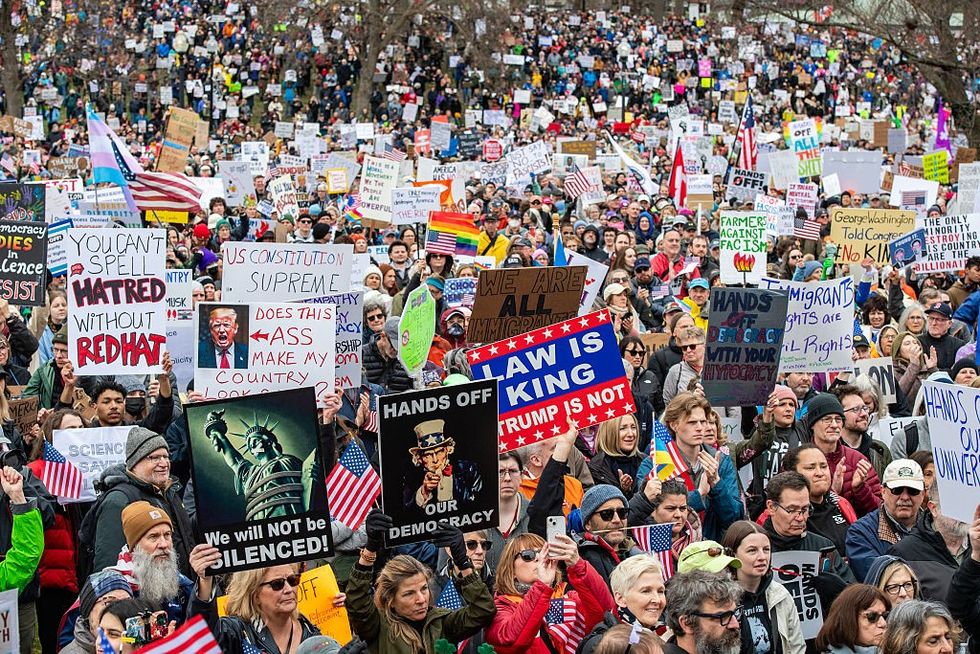
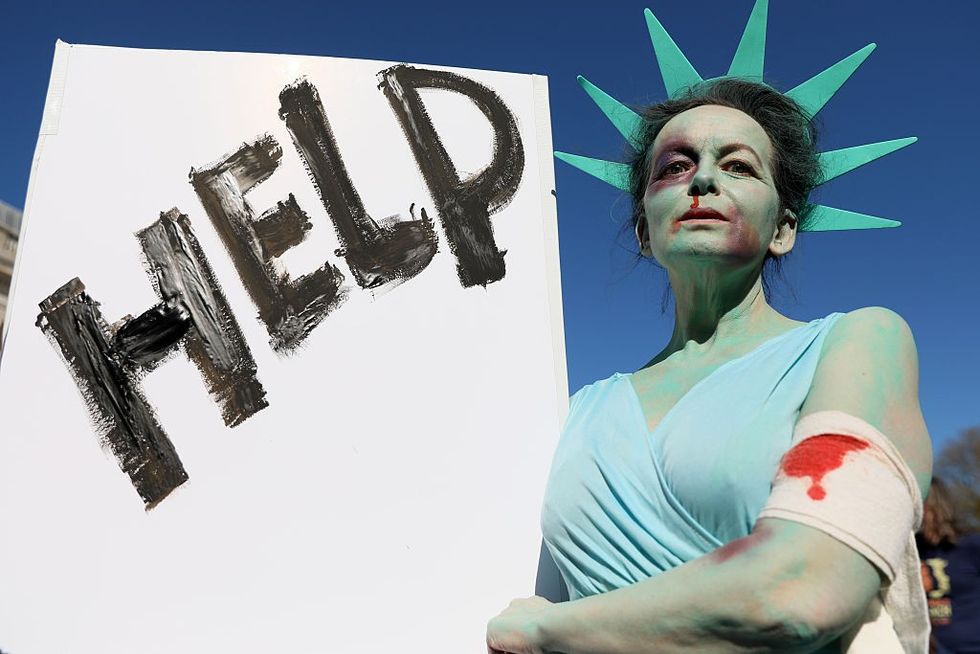
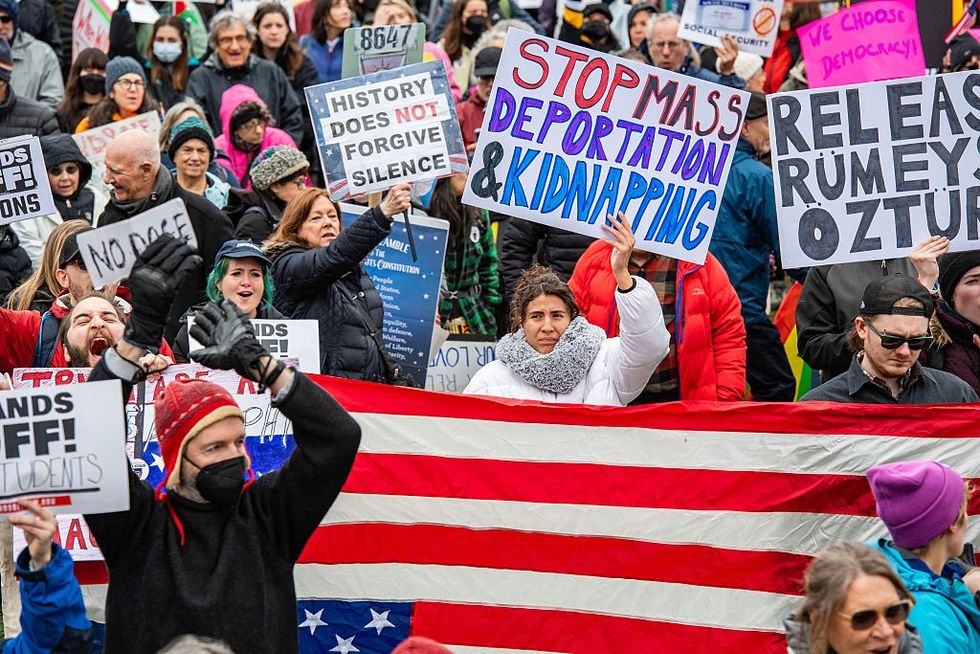
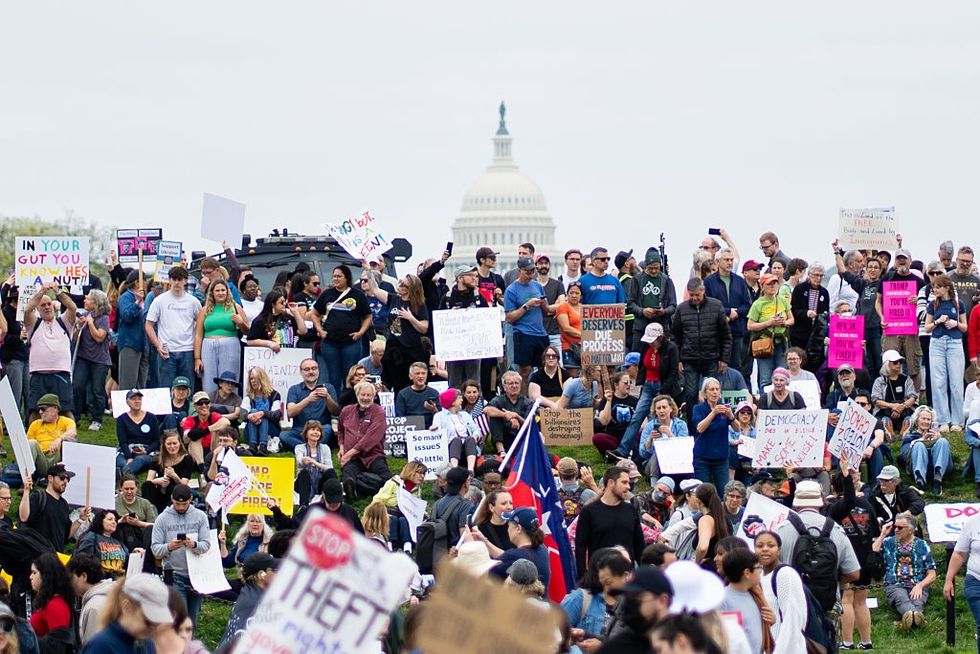
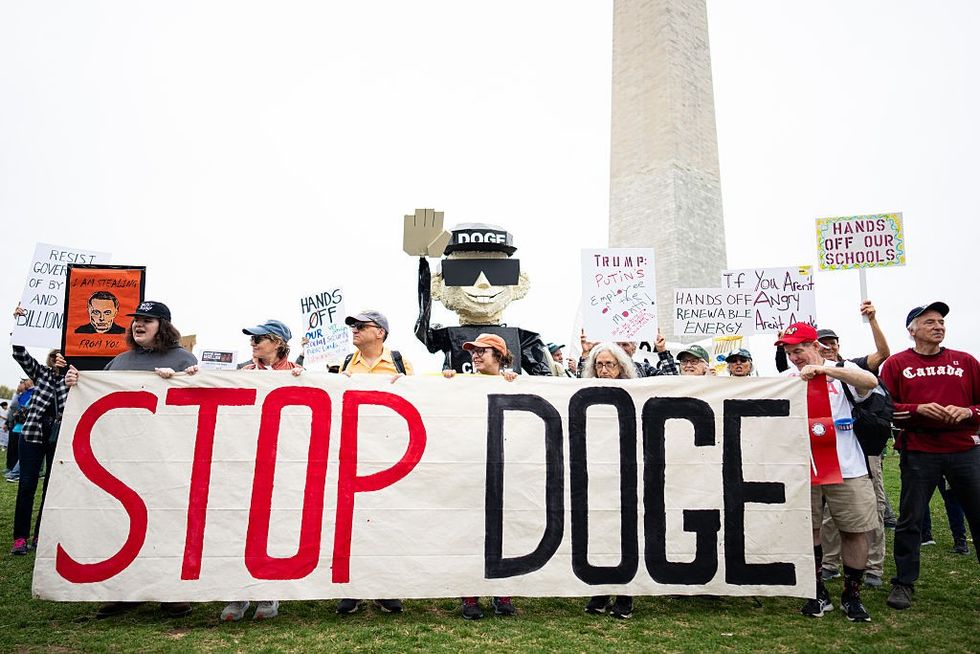
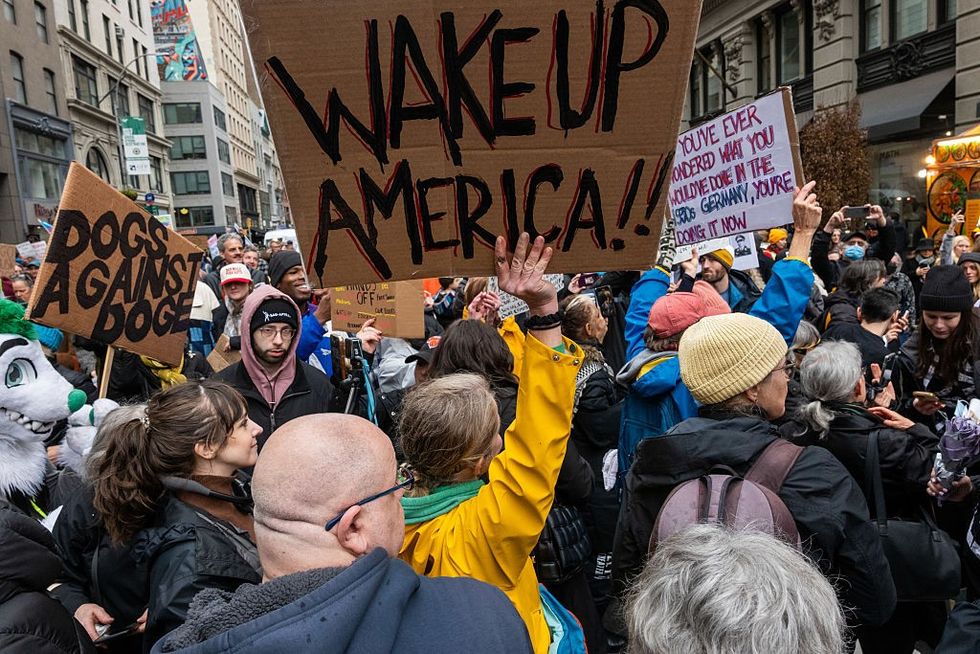
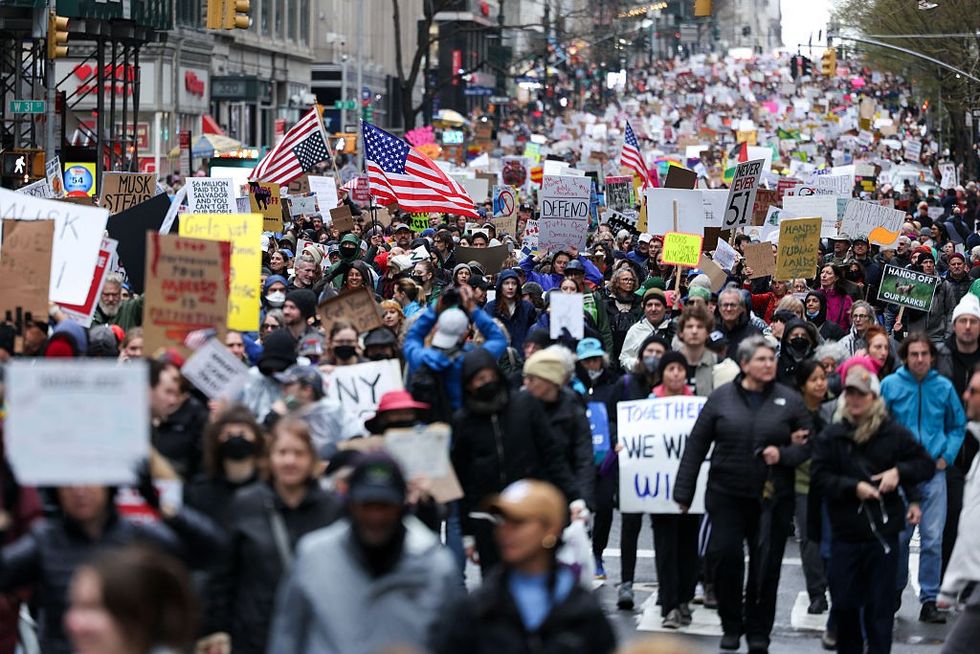
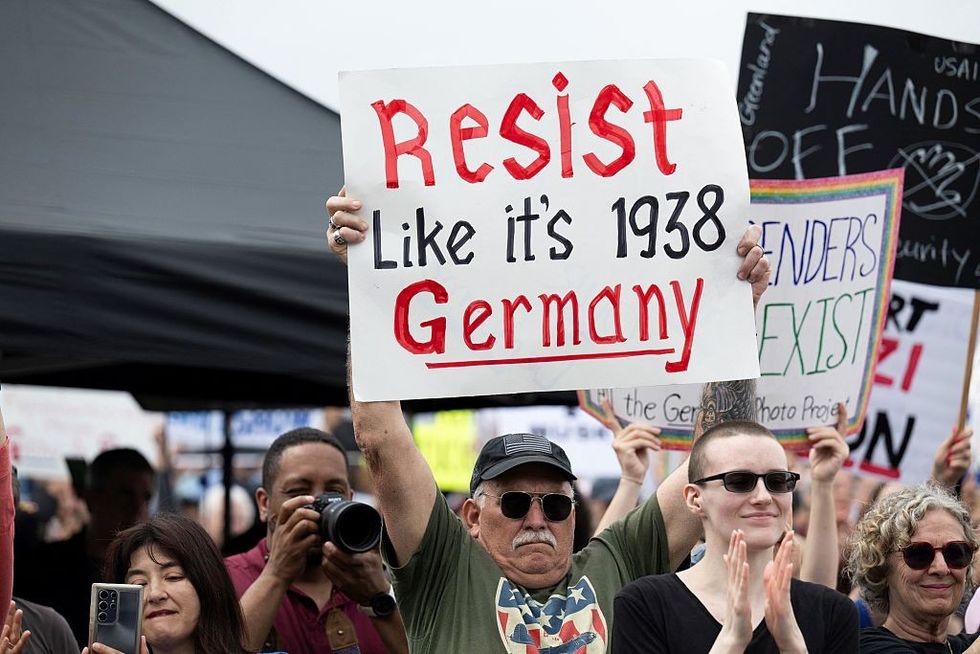
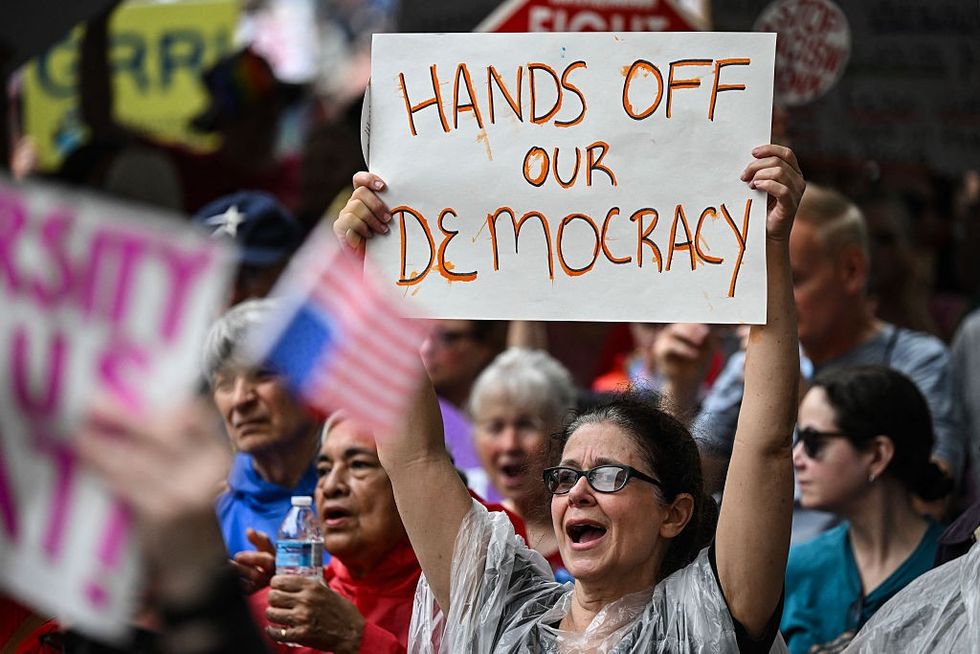
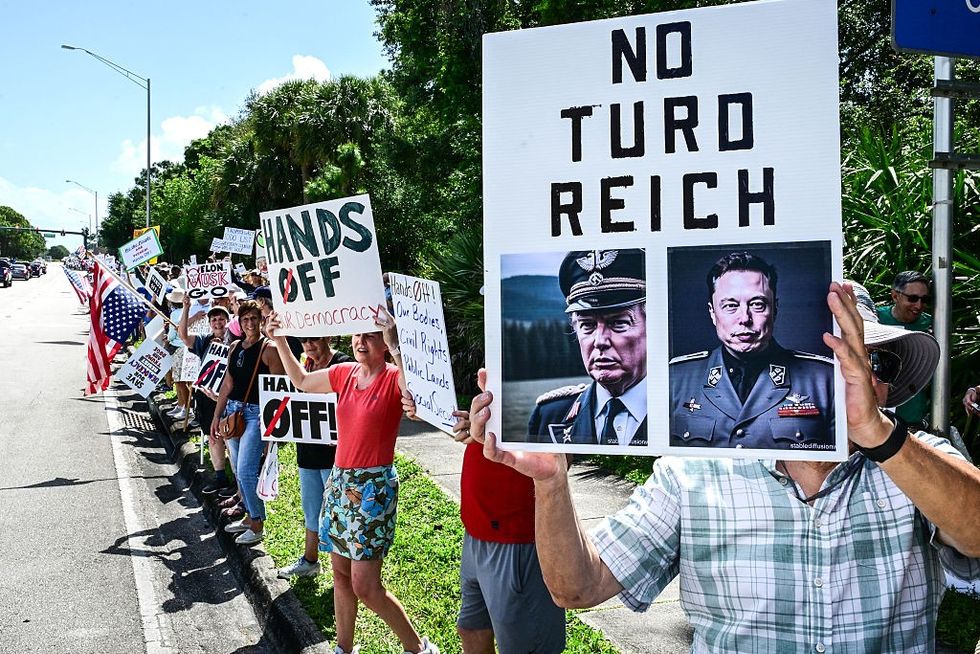
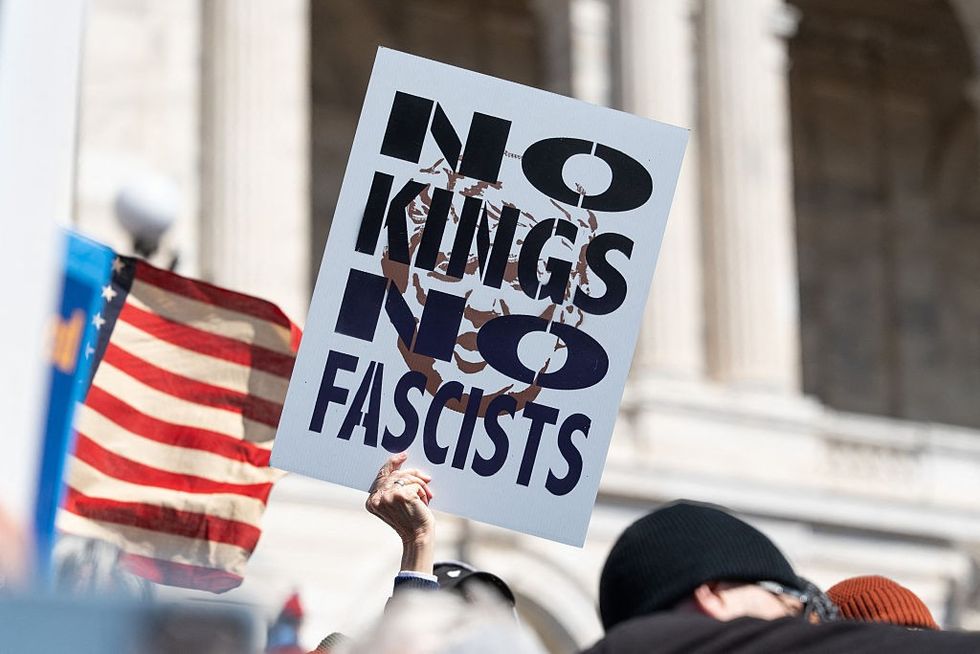
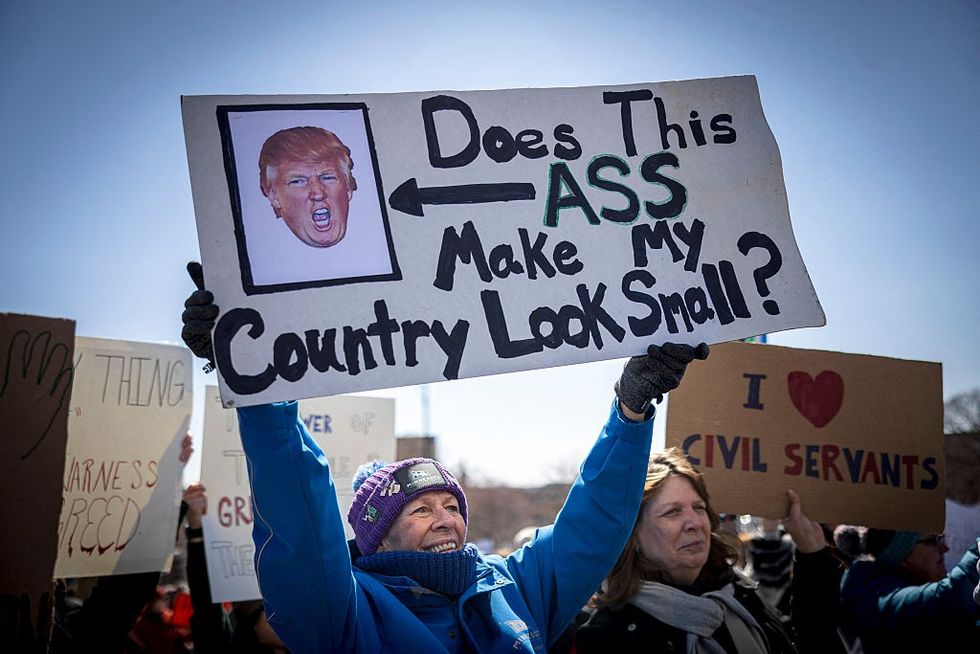
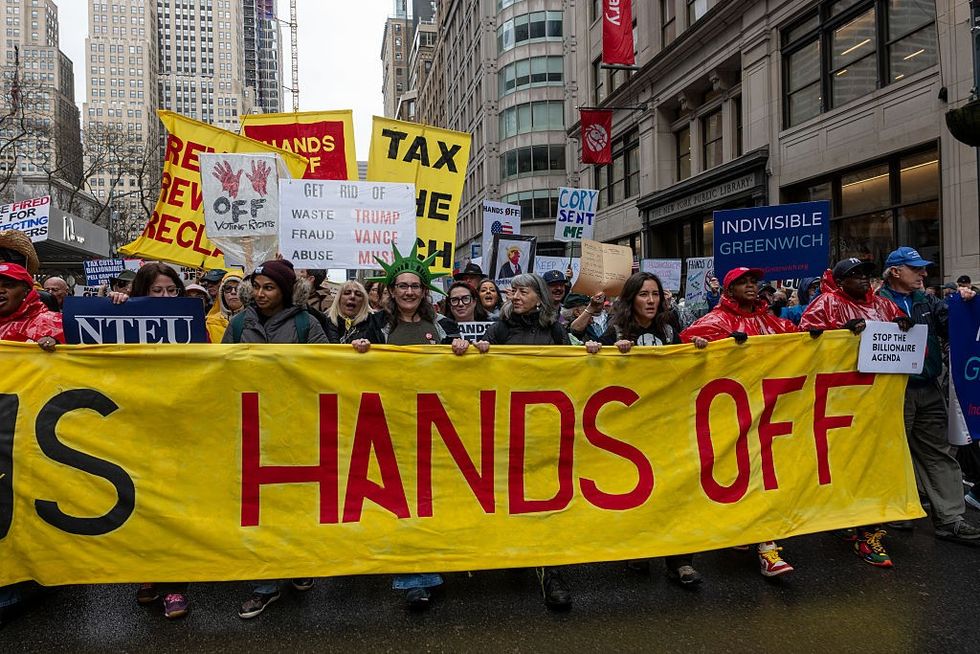
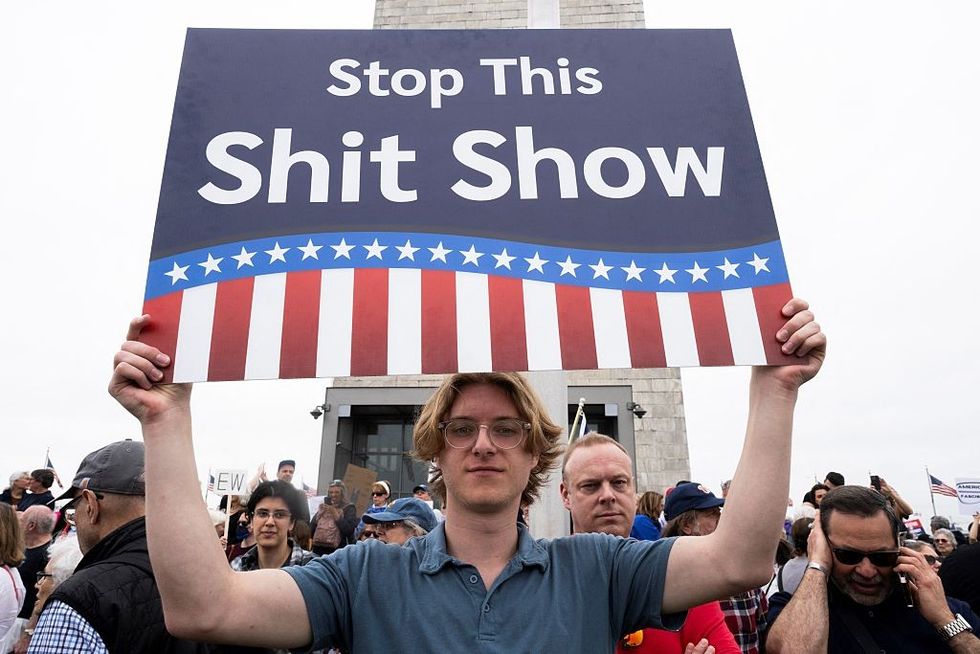
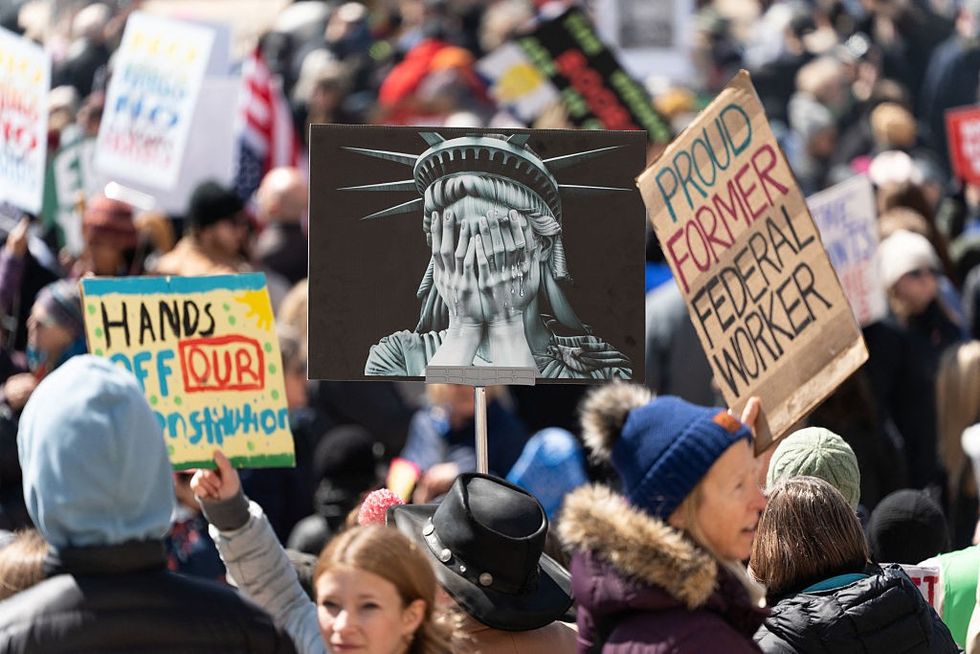
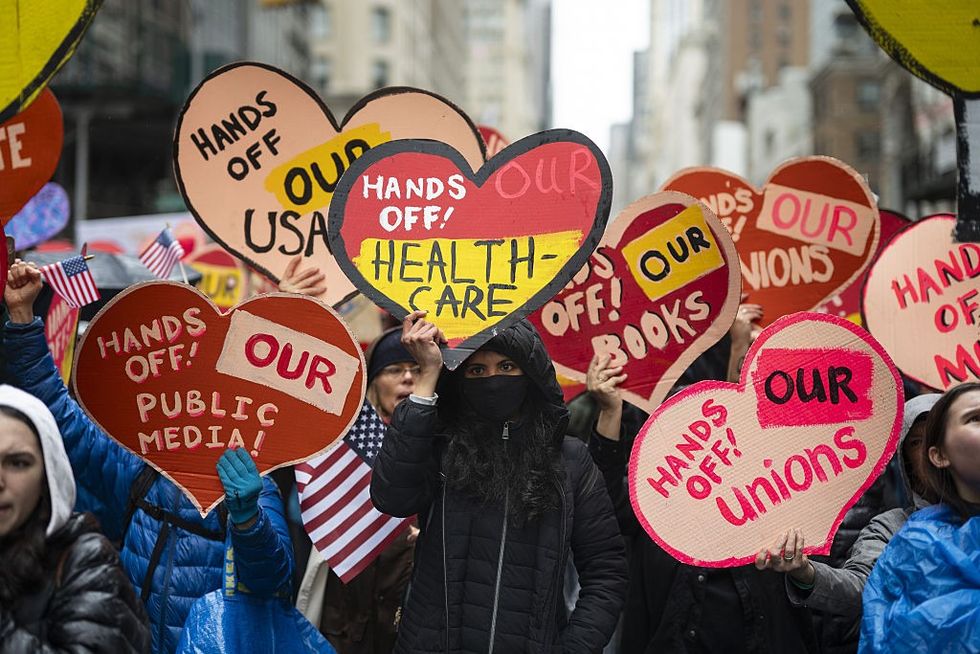
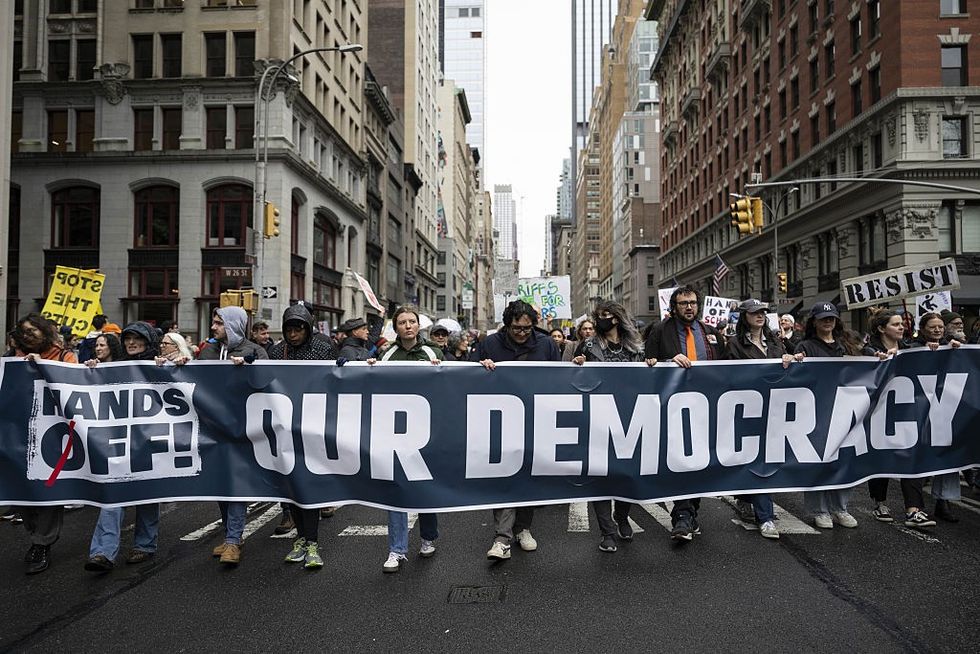
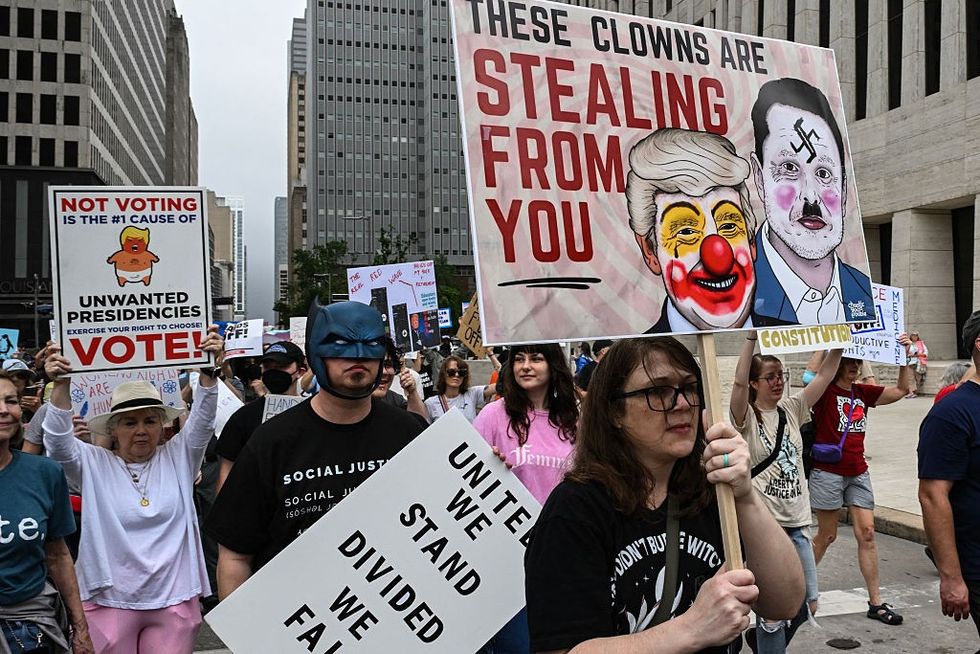
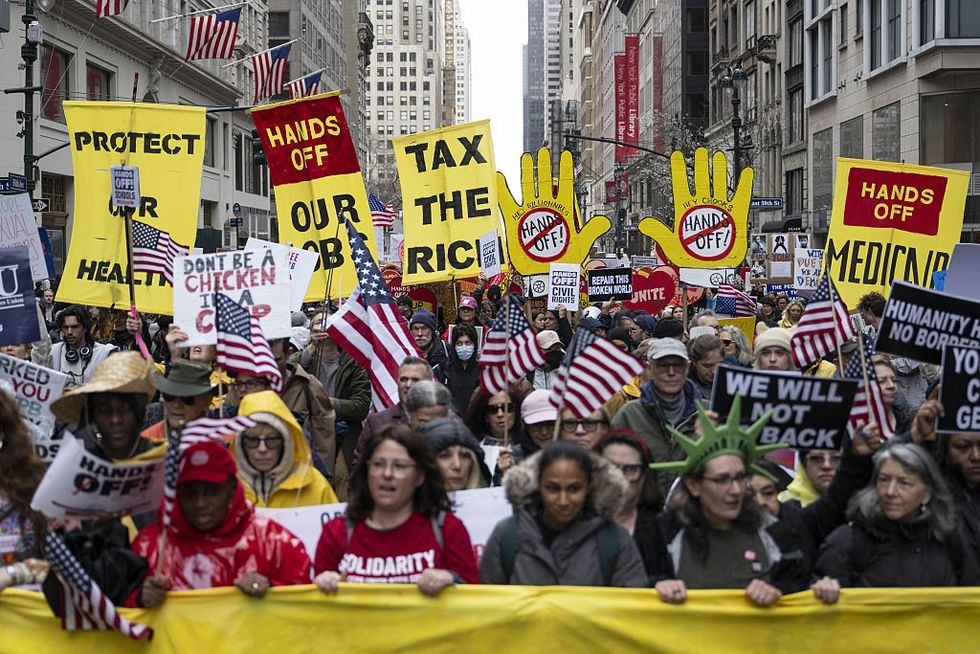
"Everyone involved in this crime against humanity, and everyone who covered it up, would face prosecution in a world that had any shred of dignity left."
A video presented to officials at the United Nations on Friday and first made public Saturday by the New York Times provides more evidence that the recent massacre of Palestinian medics in Gaza did not happen the way Israeli government claimed—the latest in a long line of deception when it comes to violence against civilians that have led to repeated accusations of war crimes.
The video, according to the Palestine Red Crescent Society (PRCS), was found on the phone of a paramedic found in a mass grave with a bullet in his head after being killed, along with seven other medics, by Israeli forces on March 23. The eight medics, buried in the shallow grave with the bodies riddled with bullets, were: Mustafa Khafaja, Ezz El-Din Shaat, Saleh Muammar, Refaat Radwan, Muhammad Bahloul, Ashraf Abu Libda, Muhammad Al-Hila, and Raed Al-Sharif. The video reportedly belonged to Radwan. A ninth medic, identified as Asaad Al-Nasasra, who was at the scene of the massacre, which took place near the southern city of Rafah, is still missing.
The PRCS said it presented the video—which refutes the explanation of the killings offered by Israeli officials—to members of the UN Security Council on Friday.
"They were killed in their uniforms. Driving their clearly marked vehicles. Wearing their gloves. On their way to save lives," Jonathan Whittall, head of the UN's humanitarian affairs office in Palestine, said last week after the bodies were discovered. Some of the victims, according to Gaza officials, were found with handcuffs still on them and appeared to have been shot in the head, execution-style.
The Israeli military initially said its soldiers "did not randomly attack" any ambulances, but rather claimed they fired on "terrorists" who approached them in "suspicious vehicles." Lt. Col. Nadav Shoshani, an IDF spokesperson, said the vehicles that the soldiers opened fire on were driving with their lights off and did not have clearance to be in the area. The video evidence directly contradicts the IDF's version of events.
As the Times reports:
The Times obtained the video from a senior diplomat at the United Nations who asked not to be identified to be able to share sensitive information.
The Times verified the location and timing of the video, which was taken in the southern city of Rafah early on March 23. Filmed from what appears to be the front interior of a moving vehicle, it shows a convoy of ambulances and a fire truck, clearly marked, with headlights and flashing lights turned on, driving south on a road to the north of Rafah in the early morning. The first rays of sun can be seen, and birds are chirping.
In an interview with Drop Site News published Friday, the only known paramedic to survive the attack, Munther Abed, explained that he and his colleagues "were directly and deliberately shot at" by the IDF. "The car is clearly marked with 'Palestinian Red Crescent Society 101.' The car's number was clear and the crews' uniform was clear, so why were we directly shot at? That is the question."
The video's release sparked fresh outrage and demands for accountability on Saturday.
"The IDF denied access to the site for days; they sent in diggers to cover up the massacre and intentionally lied about it," said podcast producer Hamza M. Syed in reaction to the new revelations. "The entire leadership of the Israeli army is implicated in this unconscionable war crime. And they must be prosecuted."
"Everyone involved in this crime against humanity, and everyone who covered it up, would face prosecution in a world that had any shred of dignity left," said journalist Ryan Grim of DropSite News.